Related Research Articles

Sir Henry Campbell-Bannerman was a British statesman and Liberal politician who served as Prime Minister of the United Kingdom from 1905 to 1908 and Leader of the Liberal Party from 1899 to 1908. He also served as Secretary of State for War twice, in the cabinets of Gladstone and Rosebery. He was the first first lord of the treasury to be officially called the "prime minister", the term only coming into official usage five days after he took office. He remains the only person to date to hold the positions of Prime Minister and Father of the House at the same time, and the last Liberal leader to gain a UK parliamentary majority.
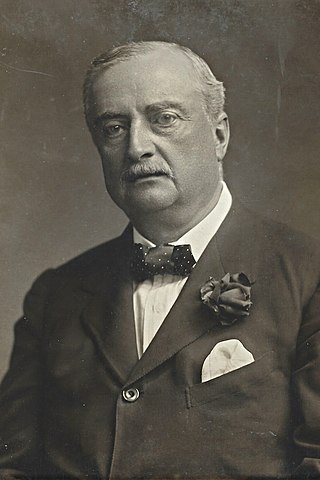
John Edward Redmond was an Irish nationalist politician, barrister, and MP in the House of Commons of the United Kingdom. He was best known as leader of the moderate Irish Parliamentary Party (IPP) from 1900 until his death in 1918. He was also leader of the paramilitary organisation the Irish National Volunteers (INV).
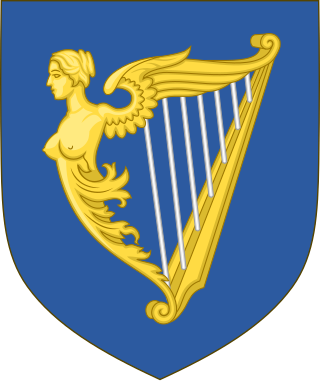
The Irish Parliamentary Party was formed in 1874 by Isaac Butt, the leader of the Nationalist Party, replacing the Home Rule League, as official parliamentary party for Irish nationalist Members of Parliament (MPs) elected to the House of Commons at Westminster within the United Kingdom of Great Britain and Ireland up until 1918. Its central objectives were legislative independence for Ireland and land reform. Its constitutional movement was instrumental in laying the groundwork for Irish self-government through three Irish Home Rule bills.

William O'Brien was an Irish nationalist, journalist, agrarian agitator, social revolutionary, politician, party leader, newspaper publisher, author and Member of Parliament (MP) in the House of Commons of the United Kingdom of Great Britain and Ireland. He was particularly associated with the campaigns for land reform in Ireland during the late 19th and early 20th centuries as well as his conciliatory approach to attaining Irish Home Rule.
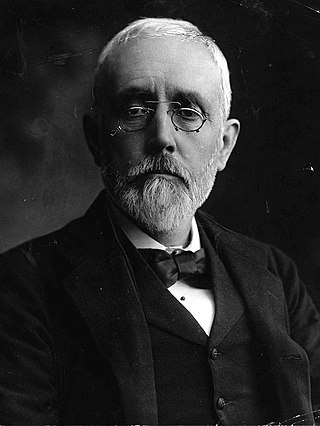
John Dillon was an Irish politician from Dublin, who served as a Member of Parliament (MP) for over 35 years and was the last leader of the Irish Parliamentary Party. By political disposition Dillon was an advocate of Irish nationalism, originally a follower of Charles Stewart Parnell, supporting land reform and Irish Home Rule.

The Government of Ireland Act 1914, also known as the Home Rule Act, and before enactment as the Third Home Rule Bill, was an Act passed by the Parliament of the United Kingdom intended to provide home rule for Ireland. It was the third such bill introduced by a Liberal government during a 28-year period in response to agitation for Irish Home Rule.

Antony Patrick MacDonnell, 1st Baron MacDonnell,, known as Sir Antony MacDonnell between 1893 and 1908, was an Irish civil servant, much involved in the Indian land reform and famine relief in India. He was Permanent Under-Secretary to the Lord Lieutenant of Ireland (1902–1908); Member of the Council of India (1902); Privy Councillor (1902); Lieutenant-Governor of the United Provinces of Agra and Oudh (1895–1901); Lieutenant-Governor of Bengal (1893–1895); Chief Commissioner of the Central Provinces (1890–1893); Chief Commissioner of Burma (1889–1890); Home Secretary to the Central Government of India (1886–1889); Secretary to the Government of Bengal and the Bengal Legislative Council.

Augustine Birrell KC was a British Liberal Party politician, who was Chief Secretary for Ireland from 1907 to 1916. In this post, he was praised for enabling tenant farmers to own their property, and for extending university education for Catholics. But he was criticised for failing to take action against the rebels before the Easter Rising, and resigned. A barrister by training, he was also an author, noted for humorous essays.

Walter Hume Long, 1st Viscount Long,, was a British Unionist politician. In a political career spanning over 40 years, he held office as President of the Board of Agriculture, President of the Local Government Board, Chief Secretary for Ireland, Secretary of State for the Colonies and First Lord of the Admiralty. He is also remembered for his links with Irish Unionism, and served as Leader of the Irish Unionist Party in the House of Commons from 1906 to 1910.

Daniel Desmond Sheehan, usually known as D. D. Sheehan was an Irish nationalist, politician, labour leader, journalist, barrister and author. He served as Member of Parliament (MP) in the House of Commons of the United Kingdom of Great Britain and Ireland representing Mid-Cork from 1901 to 1918, a constituency comprising the districts of Ahadallane, Ballincollig, Ballyvourney, Blarney, Coachford, Farran, Inchigeelagh, Macroom, Millstreet and Shandangan. As co-founder and President of the Irish Land and Labour Association, he was credited with considerable success in land reform, labour reforms and in rural state housing. From 1909, he was General Secretary of the Central Executive of the All-for-Ireland League, favouring a policy of National reconciliation between all creeds and classes in Ireland. During World War I he served as Irish regiments officer with the 16th (Irish) Division in France, 1915–16. He resigned his parliamentary seat in 1918 and lived in England for several years, returning to Dublin following the ending of the civil war, when he was appointed editor of the Dublin Chronicle.

Joseph Devlin was an Irish journalist and influential nationalist politician. He was a Member of Parliament (MP) for the Irish Parliamentary Party in the House of Commons of the United Kingdom. Later Devlin was an MP and leader of the Nationalist Party in the Parliament of Northern Ireland. He was referred to as "the duodecimo Demosthenes" by the Irish politician Tim Healy which Devlin took as a compliment.

The All-for-Ireland League (AFIL) was an Irish, Munster-based political party (1909–1918). Founded by William O'Brien MP, it generated a new national movement to achieve agreement between the different parties concerned on the historically difficult aim of Home Rule for the whole of Ireland. The AFIL established itself as a separate non-sectarian party in the House of Commons of the United Kingdom of Great Britain and Ireland, binding a group of independent nationalists MPs to pursue a broader concept of Irish nationalism, a consensus of political brotherhood and reconciliation among all Irishmen, primarily to win Unionist consent to an All-Ireland parliamentary settlement.

The Irish Land and Labour Association (ILLA) was a progressive movement founded in the early 1890s in Munster, Ireland, to organise and pursue political agitation for small tenant farmers' and rural labourers' rights. Its branches also spread into Connacht. The ILLA was known under different names—Land and Labour Association (LLA) or League (LLL). Its branches were active for almost thirty years, and had considerable success in propagating labour ideals before their traditions became the basis for the new labour and trade unions movements, with which they gradually amalgamated.
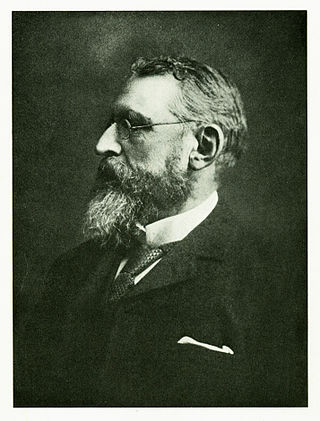
The United Irish League (UIL) was a nationalist political party in Ireland, launched 23 January 1898 with the motto "The Land for the People". Its objective to be achieved through agrarian agitation and land reform, compelling larger grazier farmers to surrender their lands for redistribution among the small tenant farmers. Founded and initiated at Westport, County Mayo by William O'Brien, it was supported by Michael Davitt MP, John Dillon MP, who worded its constitution, Timothy Harrington MP, John O'Connor Power MP and the Catholic clergy of the district. By 1900 it had expanded to be represented by 462 branches in twenty-five counties.
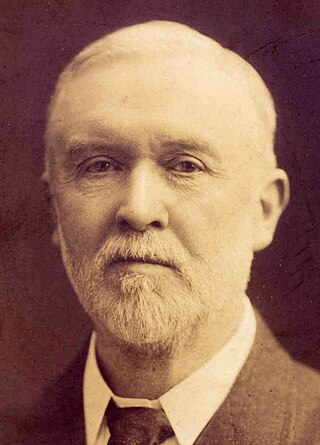
John Joseph Clancy, usually known as J. J. Clancy, was an Irish nationalist politician and Member of Parliament (MP) in the House of Commons for North Dublin from 1885 to 1918. He was one of the leaders of the later Irish Home Rule movement and promoter of the Housing of the Working Classes (Ireland) Act 1908, known as the Clancy Act. Called to the Irish Bar in 1887, he became a King's Counsel in 1906.
John O’Donnell (1866–1920) was an Irish journalist, Nationalist politician and Member of Parliament (MP) in the United Kingdom House of Commons from 1900 to 1910.

The Home Rule movement was a movement that campaigned for self-government for Ireland within the United Kingdom of Great Britain and Ireland. It was the dominant political movement of Irish nationalism from 1870 to the end of World War I.
The Land Conference was a successful conciliatory negotiation held in the Mansion House in Dublin, Ireland between 20 December 1902 and 4 January 1903. In a short period it produced a unanimously agreed report recommending an amiable solution to the long waged land war between tenant farmers and their landlords. Advocating a massive scheme of voluntary land purchase, it provided the basis for the most important land reform ever introduced by any Government of the United Kingdom of Great Britain and Ireland during the period of the Act of Union (1801–1922), the Land Purchase (Ireland) Act 1903.
The Irish Reform Association (1904–1905) was an attempt to introduce limited devolved self-government to Ireland by a group of reform oriented Irish unionist land owners who proposed to initially adopt something less than full Home Rule. It failed to gain acceptance due to fierce opposition from Ulster Unionists who on the one hand claimed it went too far, and on the other hand denounced by Irish Nationalists who claimed it did not go far enough. Also known as the Irish Reform Movement, it ended in calamity for most of those concerned.
The issue of Ireland has been a major one in British politics, intermittently so for centuries. Britain's attempts to control and administer the island, or parts thereof, has had significant consequences for British politics, especially in the 19th and 20th centuries. Although nominally autonomous until the end of the 18th century, Ireland became part of the United Kingdom of Great Britain and Ireland in 1801.
References
Sources
- Primary
- Hansard: "Irish Council Bill" index and "Irish Councils Bill" index
- [Bill 182] Irish Council Bill. Parliamentary Papers. Vol. Session 1907, Vol. II. 1907. p. 481.
- Secondary
- Campbell, Fergus (September 2007). "Who Ruled Ireland? The Irish Administration, 1879–1914". The Historical Journal. Cambridge University Press. 50 (3): 623–644. doi:10.1017/S0018246X07006280. JSTOR 20175114. S2CID 162546437.
- Hepburn, A. C. (September 1971). "The Irish Council Bill and the Fall of Sir Antony MacDonnell, 1906–7". Irish Historical Studies. Cambridge University Press. 17 (68): 470–498. doi:10.1017/S0021121400111629. JSTOR 30005305. S2CID 191738907.
- Jalland, Patricia (June 1976). "A Liberal Chief Secretary and the Irish Question: Augustine Birrell, 1907–1914". The Historical Journal. Cambridge University Press. 19 (2): 421–451. doi:10.1017/S0018246X00010232. JSTOR 2638571. S2CID 159970678.
- Morton, Grenfell (15 July 2014) [1980]. Home Rule and the Irish Question. Routledge. ISBN 9781317881094 . Retrieved 22 November 2017.
Citations
- ↑ A Lawyer (24 December 1910). "Letter: The Irish Council Bill". The Spectator (4304): 16.
- 1 2 "Mr. O'Brien's Version of Recent Irish History". The Spectator (4955): 17–18. 16 June 1923.
- 1 2 3 O'Brien, William (1923). "Introduction; X". The Irish Revolution and how it came about. London: Allen & Unwin. pp. 35–36. Retrieved 24 November 2017.
- 1 2 3 4 Campbell-Bannerman, Henry (3 June 1907). "Business of the Session". Parliamentary Debates (Hansard) . HC Deb vol 175 c323. Retrieved 22 November 2017.
- ↑ "Irish Council Bill". Parliamentary Debates (Hansard) . 7 May 1907. HC Deb vol 174 cc195–6. Retrieved 22 November 2017.
- ↑ "Irish Council Bill". Parliamentary Debates (Hansard) . 29 July 1907. HC Deb vol 179 cc693–4. Retrieved 22 November 2017.
- ↑ Morton 2014 p.45
- ↑ Morton 2014 pp.51–53
- ↑ Jalland 1976 p.427
- 1 2 Jalland 1976 p.429
- 1 2 3 4 5 Mulvagh, Conor (3 June 2016). The Irish Parliamentary Party at Westminster, 1900-18. Manchester University Press. pp. 106–113. ISBN 9781526100177 . Retrieved 23 November 2017.
- ↑ Hepburn 1971 p.486
- 1 2 O'Brien, Joseph Valentine (1976). William O'Brien and the Course of Irish Politics, 1881-1918 . University of California Press. pp. 175–176. ISBN 9780520028869 . Retrieved 22 November 2017.
- ↑ Redmond, John (7 May 1907). "Irish Council". Parliamentary Debates (Hansard) . HC Deb vol 174 c131. Retrieved 24 November 2017.
- ↑ Titley, E. Brian (1983). Church, State, and the Control of Schooling in Ireland 1900-1944. McGill-Queen's University Press. pp. 28–30. ISBN 9780773503946 . Retrieved 22 November 2017.
- ↑ "Extract from 14th Annual Report 1907". Decade of Centenaries : Annual reports of the Irish Trades Union Congress. National Archives of Ireland . Retrieved 24 November 2017.
- ↑ Campbell 2007 p.636
- ↑ Campbell 2007 p.637
- ↑ Hepburn 1971
- ↑ Jalland 1976 p.430; Morton 2014 pp.54–55
- ↑ Morton 2014 pp.55–59
- ↑ Irish Council Bill, Second Schedule (3)
- ↑ Irish Council Bill, §26(5)
- 1 2 Irish Council Bill, §1(1)
- ↑ Hepburn p.487
- ↑ Irish Council Bill, §1(1) and First Schedule
- ↑ Irish Council Bill, §1(2)
- ↑ Irish Council Bill, §1(5)
- ↑ Irish Council Bill, §2(2)(a)
- ↑ Irish Council Bill, §2(3) and Third Schedule
- ↑ Irish Council Bill, Part II
- ↑ Irish Council Bill, §15
- ↑ "Government of Ireland Act 1920". 23 December 1920. §37(1). Retrieved 24 November 2017.